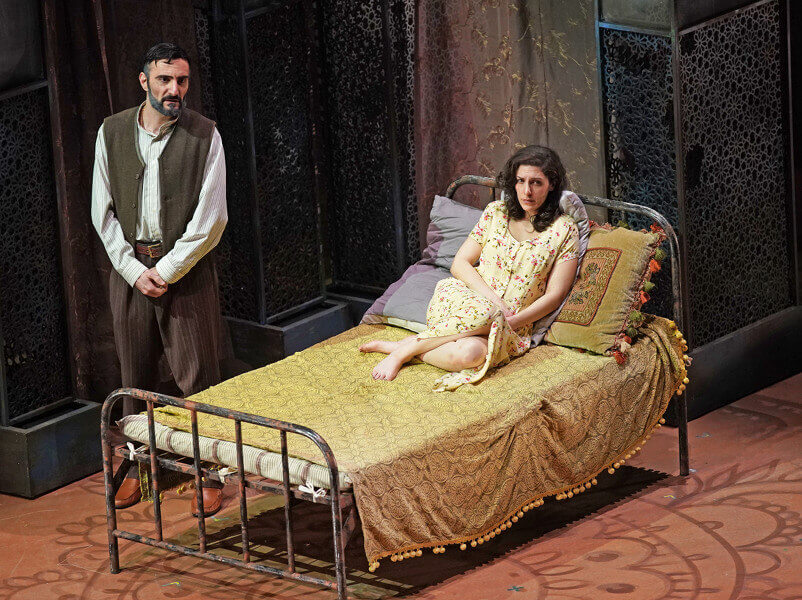By Courtney Leigh Church, March 18, 2018
I remember, quite vividly, reading Khaled Hosseini’s novel, “A Thousand Splendid Suns” for the first time as a teenager about a decade ago. I had picked it up on a whim from my high school library one afternoon, recognizing Hosseini’s name from his earlier novel, “The Kite Runner.” I liked his first book, so I expected no less from “Splendid Suns.”
I did not expect, however, to be so enthralled by the book that I wouldn’t set it down until I was finished at about two o’clock in the morning.
Over the years, one quote in particular from the book has stuck with me: “You see, some things I can teach you. Some you learn from books. But there are things that, well, you have to see and feel.”
In many ways the same thing can be said about the novel itself.
On the page, Hosseini is afforded the space to explore the complex sociopolitical situation in which his characters find themselves. On the stage, Ursula Rani Sarma’s adaptation pares down the four-part book into a visceral torrent of pure sensation that you most certainly see and feel.
Set during the Afghan Civil War (1989-96) and the Taliban control that followed, war and militarism serve as the backdrop for a tale of domestic abuse, motherhood, and, above all, adversity.
The play opens as Laila (Mirian Katrib) and her family prepare to escape war-torn Kabul and flee to Peshawar, Pakistan. Before they can depart, however, a bomb destroys the family home. It claims the life of Laila’s parents and leaves her unconscious and near death.

Pulled from the rubble by her neighbour, Rasheed (Anousha Alamian) and nursed back to health by his wife, Mariam (Deena Aziz), Laila grieves for her parents and attempts to contact her childhood love, Tariq (Shelly Antony) who previously fled to Pakistan with his family.
Hearing that Tariq, too, has died and having no money to escape Kabul, Laila has little choice but to accept Rasheed’s offer to become his second wife.
What unfolds is a tale about two women forced to negotiate their relationship with one another around the violence they both suffer at the hands of their husband, Rasheed. The women are opposites in every way: Miriam was an unloved and illegitimate child, Laila doted upon by her father; Miriam is ageing and childless, Laila young and fertile; Miriam is uneducated, Laila passionate for the poetry her father adored.

Despite their differences, they eventually come to understand and empathise with the other’s struggle. They choose to work together for the sake of Laila’s children and one another rather than attempt to resist Rasheed alone if they want to survive. As Nana (Natascha Girgis) reminds us, in this world there is “Only one skill. And it’s this: tahamul. Endure.”
The play hinges on the bond between Miriam and Laila, a bond that is absolutely convincing thanks to the skill exhibited by Deena Aziz and Mirian Katrib as Miriam and Laila. Aziz’s Miriam is physically and emotionally rigid at first, and over time softens into a cooing and loving grandmother figure to Laila’s children. Katrib’s whimsical Laila matures over the course of the play into a strong and resilient mother. At times her sharp delivery is exaggerated and borderline overdramatic, though this reminds us of the vast age difference between her and Miriam.
The vitriol and disdain that Anousha Alamian’s Rasheed demonstrates is utterly detestable; he has done an amazing job of capturing the violent and abusive husband of Hosseini’s novel.
Baraka Rahmani’s Aziza and Hayden Baertsoen’s Zalmai are impressive as Laila’s children. Rahmani captures the youthful energy of a girl on the cusp of womanhood. She is playful but painfully cognizant of the world in which she finds herself. Baertsoen’s innocence rings through moments of young misogyny; he is a product of his father’s making, not of his own volition.
The cast’s talent is emphasised by the behind-the-scenes work of an equally talented production team.

Like his work in “Blind Date,” Ken MacDonald’s set design includes a multi-layered backdrop. The various layers – mountains, open sky, and bright light – provide physical depth that accompanies the emotional depth of the characters on stage. The set is never overwhelming or elaborate, and instances of supreme sparseness bring the action to the fore.
When the actors’ pace slows down the set commands your attention. In both the opening and final scenes characters waft slowly across the stage. In these moments it is as if you are no longer in a theatre but in front of a vast and awe-inspiring painting.
Miriam and Laila’s memories are signalled with lighting changes; bright beams command the scene indicate a moment of memory or imagined ghosts on stage. Lighting designers Robert Wierzel and Andrew Griffin are in perfect harmony with the actors during flashbacks. Together with sound designer Jake Rodriguez, light and sound immerse the entire theatre in the action.
Under Haysam Kadri’s direction, “A Thousand Splendid Suns” wraps itself tightly around your chest and holds your heart in its grasp. This is a production that you will carry with you long after the curtain falls.
Details, Details:
A Thousand Splendid Suns
The Grand Theatre
March 13 – 31
Purchase tickets online
Box office: 519-672-8800
 Courtney Church is a Ph.D. candidate in the Department of English and Writing Studies at Western University, where she researches modern and contemporary British theatre. Most of her time in the theatre is spent behind the scenes, tinkering with set design and thinking about props.
Courtney Church is a Ph.D. candidate in the Department of English and Writing Studies at Western University, where she researches modern and contemporary British theatre. Most of her time in the theatre is spent behind the scenes, tinkering with set design and thinking about props.



What did you think?
You May Also Like
A vision of Kabul comes to London
Review: A Christmas Carol at the Grand Theatre
Review: What a Young Wife Ought to Know
Victor Garber Visiting The Grand